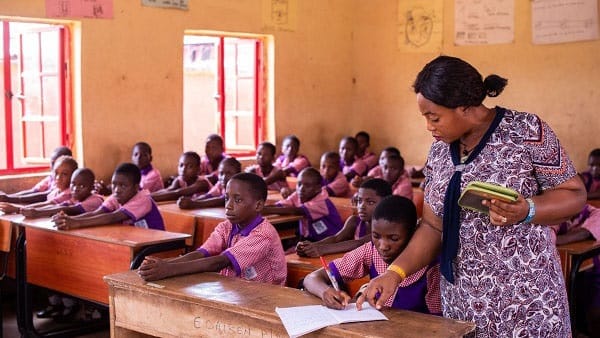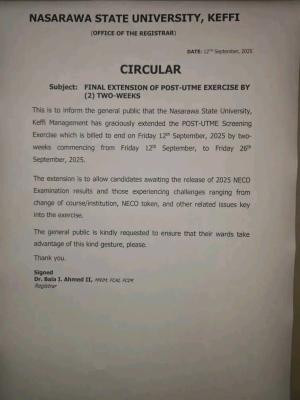In a move that signals Nigeria’s growing commitment to global competitiveness and cultural exchange, the Federal Government has announced that Mandarin Chinese will now be offered as part of the senior secondary school curriculum. This development was confirmed during the inauguration of a new Chinese Corner at Government Secondary School, Tudun Wada, Abuja, as part of ongoing curriculum reforms and international collaboration.
The initiative is being implemented with support from the China Civil Engineering Construction Corporation (CCECC), under its Corporate Social Responsibility programme. With the commissioning of the Tudun Wada centre, Abuja alone now has 14 Chinese Corners in secondary schools, serving as hubs for students to learn the language and immerse themselves in Chinese culture.
Why Mandarin?
Mandarin Chinese is the most widely spoken language in the world, with over 1.1 billion speakers. Beyond sheer numbers, Mandarin has become a language of influence in commerce, diplomacy, technology, and education. Nigeria, as Africa’s largest economy and a nation with deepening bilateral ties with China, is positioning its students to be part of this global linguistic and cultural landscape.
The inclusion of Mandarin in Nigeria’s curriculum is motivated by several key factors:
- Global Trade and Business Opportunities
China is one of Nigeria’s strongest trading partners, with investments in railways, roads, power projects, and industries. Proficiency in Mandarin can open doors for Nigerian youths in international business negotiations, partnerships, and job markets. - Education and Scholarships
Thousands of African students, including Nigerians, benefit yearly from Chinese government scholarships and exchange programmes. Learning Mandarin at an early age will make Nigerian students better prepared to pursue academic opportunities in Chinese universities. - Tourism and Cultural Diplomacy
Tourism is an expanding sector, and with China ranking as the world’s largest outbound tourism market, having Mandarin-speaking professionals could boost Nigeria’s tourism industry while also deepening cross-cultural understanding. - Cognitive Development
Research shows that learning a second or third language at a young age enhances cognitive flexibility, improves memory, and strengthens problem-solving skills. Mandarin, being a tonal and character-based language, can sharpen students’ linguistic intelligence.
How the Programme Works
The Chinese Corner initiative is designed to integrate Mandarin teaching with cultural education. These corners are equipped with:
- Language learning materials such as textbooks, audio-visual aids, and digital resources.
- Cultural items including Chinese calligraphy tools, traditional artworks, and multimedia content that expose students to Chinese history and customs.
- Interactive platforms where students can engage in exchange programmes, competitions, and cultural festivals.
The long-term plan is to embed Mandarin formally into the curriculum so that students can take it as part of their WAEC/SSCE examinations in the future, just like French or Arabic.
Benefits for Nigerian Students
- Better Career Prospects
Students who master Mandarin could find opportunities in multinational companies, international organisations, embassies, and trade missions. - Global Relevance
Nigeria is becoming increasingly connected to the world economy. Knowing Mandarin gives students an edge in competing globally. - Cultural Enrichment
Learning about another culture builds tolerance, broadens horizons, and nurtures mutual respect in an increasingly interconnected world. - Access to Technology and Innovation
China is a world leader in technology, innovation, and research. Nigerian students who learn Mandarin will have easier access to Chinese resources, publications, and collaboration opportunities.
Challenges and Concerns
While the initiative is laudable, certain challenges must be addressed to make it successful:
- Teacher Availability: There is currently a shortage of trained Mandarin teachers in Nigeria. Recruiting and training local teachers will be crucial.
- Resource Inequality: Urban schools may benefit more quickly than rural schools, creating a gap in access.
- Curriculum Integration: Proper alignment with Nigeria’s educational goals and assessment systems will be necessary.
- Sustainability: Long-term government commitment and funding will determine whether the programme thrives or fades out after initial enthusiasm.
Broader Implications for Nigeria
Introducing Mandarin into the secondary school curriculum highlights Nigeria’s awareness of 21st-century realities. Language is more than communication; it is a bridge to trade, diplomacy, science, and innovation. By equipping its youth with Mandarin, Nigeria is:
- Strengthening ties with China, which remains a critical partner in infrastructure development.
- Positioning its students for opportunities in global education and employment markets.
- Diversifying linguistic education, ensuring that Nigerian students are not limited to European or African languages alone.
Looking Ahead
The introduction of Mandarin is not just a symbolic gesture—it is a practical step toward preparing Nigerian students for the realities of globalization. In the future, we could see Nigerian graduates confidently conducting business in Mandarin, pursuing postgraduate degrees in China, or even teaching the language locally.
For students, parents, and educators, this is a call to embrace change and explore new horizons. As one education stakeholder rightly put it, “Language is power, and those who speak many languages hold the keys to many doors.”
✅ Key Takeaway: Nigeria’s decision to introduce Mandarin in senior secondary schools is a bold and forward-looking move. If properly implemented, it could redefine opportunities for Nigerian students, strengthen international relations, and give the country’s young people a stronger voice in the global community.






